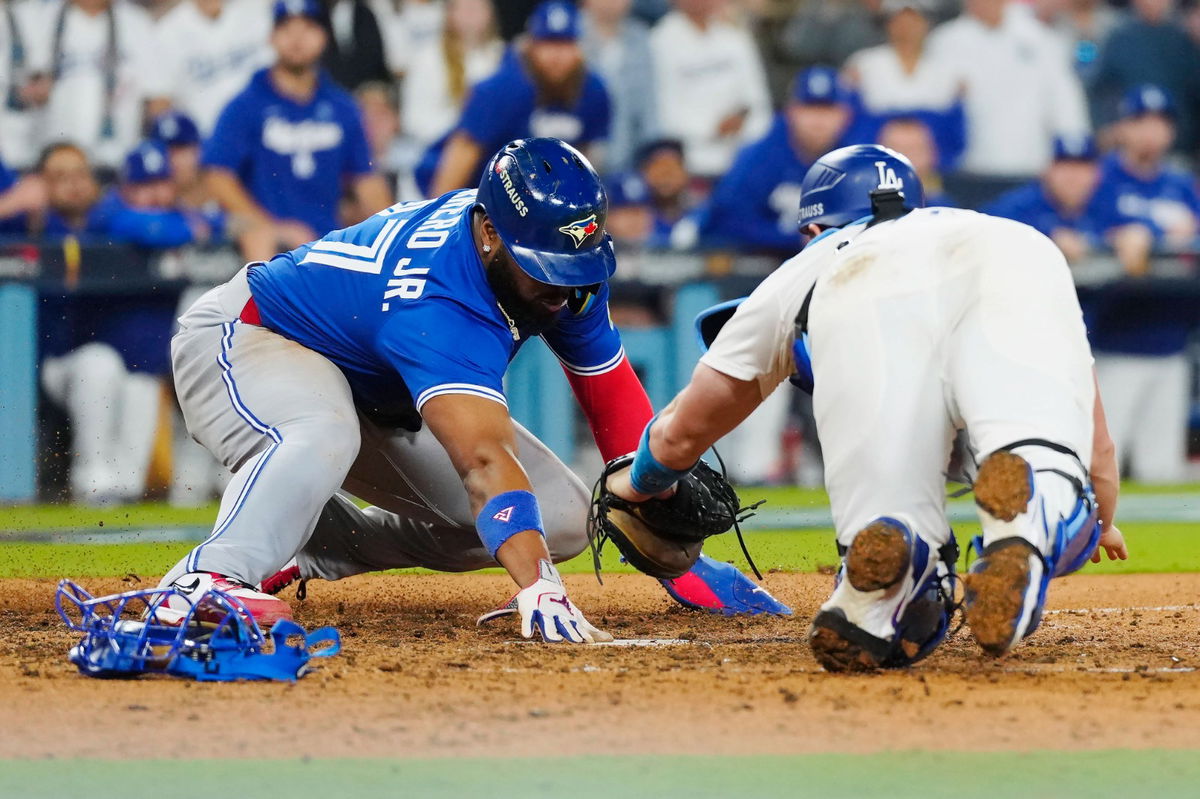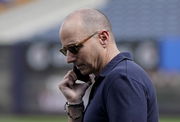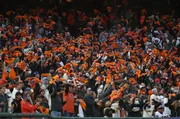
Imago
October 27, 2025, Los Angeles, California, USA: Toronto Blue Jays VLADIMIR GUERRERO Jr. (27) tags home plate to score ahead of the tag from Los Angeles Dodgers catcher Will Smith (16) during seventh inning Game 3 World Series playoff MLB, Baseball Herren, USA baseball action in Los Angeles on Monday. MLB 2025: World Series GM 1: Dodgers vs Blue Jays – ZUMAc35_ 20251027_zaf_c35_156 Copyright: xFrankxGunnx

Imago
October 27, 2025, Los Angeles, California, USA: Toronto Blue Jays VLADIMIR GUERRERO Jr. (27) tags home plate to score ahead of the tag from Los Angeles Dodgers catcher Will Smith (16) during seventh inning Game 3 World Series playoff MLB, Baseball Herren, USA baseball action in Los Angeles on Monday. MLB 2025: World Series GM 1: Dodgers vs Blue Jays – ZUMAc35_ 20251027_zaf_c35_156 Copyright: xFrankxGunnx
The gruelling 18-inning defeat, less than 18 hours prior, held nothing against a rather young Toronto squad in Game 4. On the back of Vladimir Guerrero Jr.’s homer and Shane Bieber’s solid start, they would carve themselves a 4-run lead by the bottom of the 9th. Even then, with two outs on board, Louis Varland wasn’t risking it.
Watch What’s Trending Now!
Just before the final out, the Blue Jays’ reliever kept stepping off, resulting in a balk. When asked about it, manager John Schneider admitted that it was intentional, according to MLB insider Ben Nicholson-Smith.
“I mean, it’s fair game. And we highly suspected that there was relaying, you know, which is fine. But just didn’t want to have the hitter know what was coming,” he said.
ADVERTISEMENT
With Enrique Hernández at bat and Max Muncy at second base, Varland chose to disengage three consecutive times. A pitcher is allowed to disengage legally only twice. So when he repeated it for the third time, Muncy was moved to third base. It helped the Blue Jays ward off any possibility of relaying.
When a runner is on second base, he may not hear the pitch calls that are delivered via the pitcher’s headset, but he is in a position to see the catcher’s setup and possibly even the glove grip. Third base doesn’t offer that advantage.
For what it’s worth, though, MLB allows players from second base to steal signs and convey them to the hitter. It is legal as long as it is practiced manually, without any technological involvement. The runner could either get it right or just mess with the pitcher. But Toronto was not risking giving away any advantage with Hernández — who has 11 hits in 36 at-bats leading up to the World Series — at bat.
ADVERTISEMENT
Btw, Blue Jays thought Dodgers were relaying signs in G4. That's why Louis Varland kept stepping off. John Schneider:
"I mean it's fair game. And we highly suspected that there was relaying, you know, which is fine. But just didn't want to have the hitter know what was coming"
— Ben Nicholson-Smith (@bnicholsonsmith) October 30, 2025
While still a guesswork, it might as well have worked in Toronto’s favor. With a 4-run lead already in place, Varland ensured there were no hits coming from Hernández. One that did come, ended up in a line out, drawing the inning to a close, and pushing the Blue Jays to even the series.
ADVERTISEMENT
Between that and the Game 5 victory, Toronto inched closer to rewriting records; this one’s not only about overcoming the 32-year-long title drought.
The Blue Jays are one climb away from topping an all-time chart
The Jays’ explosive offensive numbers is the story of the postseason.
ADVERTISEMENT
Reportedly, the Jays ranked fourth in MLB during the regular season with a 112 wRC+, but they’ve turned it up a notch in October, posting an MLB-best 128 wRC+.Moreover, they’ve already scored 100 runs, just one shy of the all-time playoff record, and they’re only one home run away from the non-2020 postseason record.
Simply put, this lineup has looked like one of the most dangerous World Series-hitting teams ever.
Top Stories
Blue Jays Told to Thwart Dodgers’ Plan After Scott Boras Pushes 24-Year-Old Star to Reject Reds’ Historic Deal

Yankees Veteran Leaves Brian Cashman Out to Dry With Mets Argument Amid ‘Running it Back’ Drama

Andrew Friedman Confesses a Lapse in Judgment During Dodgers World Series Logjam Vs Blue Jays

3 MLB Teams Get Sued: “Systematically Cheated Fans Out of Millions of Dollars”

MLB World Series Champion Steps In to Defend Yankees After Brian Cashman Publicly Challenges Critics

It’s a remarkable turnaround for a team that didn’t look like a contender early in the season. If you remember, by April 29, the Jays were 13–16 and under .500. But from that point on, they went on a roll, racking up 81 wins, more than any team in baseball besides the Brewers.
ADVERTISEMENT
So it’s no surprise some insiders are raising eyebrows over how consistently the Blue Jays’ bats have been producing. Now, with Toronto just one win away from a World Series title, the question is whether they can silence the noise, push past the allegations, and let their offense do the talking one last time.
ADVERTISEMENT
ADVERTISEMENT
ADVERTISEMENT